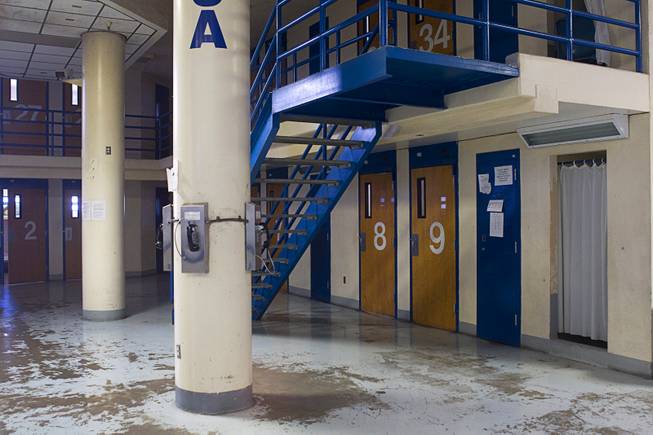
An old-style pod is shown in the north tower during a tour of the Clark County Detention Center Tuesday, July 23, 2013.
Thursday, Oct. 24, 2013 | 2 a.m.
Sun coverage
Hundreds of criminals at the Clark County Detention Center are stewing in jail, waiting months after being found guilty for judges to finally mete out their punishment.
Other lawbreakers are free on bail but await word on their fate, months after they were found guilty.
The reason: A state agency is woefully behind in giving judges the information they need about the criminals — including past crimes and their mental health — so the appropriate sentences can be ordered.
While judges and attorneys say the agency has a history of not meeting legal deadlines when it comes to completing presentencing reports, a recent spike in slowness has pushed those involved in the criminal justice system to a breaking point.
In July and August, the agency’s tardiness put the brakes on approximately 200 scheduled sentencings. In some instances, that meant keeping inmates in jail an extra two to four months.
Last year during that same period, the state agency responsible for preparing the presentencing reports, an office within the Department of Public Safety known as Parole and Probation, needed more time on only 19 cases.
But as of Oct. 17, 457 people who should have been sentenced still were occupying beds in jail, according to jail figures. While some cases were stalled for other reasons, most were related to presentencing report delays.
The agency acknowledged the problem after District Judge Douglas Smith threatened to hold it in contempt for its tardiness.
Parole and Probation promised in September to catch up on the criminals in custody, whose reports will get priority attention over those who have been released on bail and face delays in getting sentenced.
But the agency still is in violation of Nevada law, which requires people be sentenced within 45 days after their conviction, regardless of whether they are in jail. And the task is now all the harder because a law took effect Oct. 1 requiring the reports be completed within 38 days — at a time when budget cutbacks have left the office with a reduced staff of 27 report writers serving Clark County, 10 fewer than previously. The quicker preparation time is intended to allow more time for defense attorneys to scour the findings and prepare their own arguments before their clients are sentenced.
Late reports and defense attorneys questioning possible factual errors in a report are the main reasons inmates end up extending their jail stay past the deadline, said Metro Deputy Chief Todd Fasulo, who oversees the jail’s operations.
The report is essentially a road map for the rest of the criminal’s life in the system. A judge will use it to decide the criminal’s sentence, the prison will use it to decide placement and the Parole Board will use it weigh whether the criminal should be allowed back into society.
To help catch up on tardy reports, Parole and Probation employees are working overtime to complete the presentencing reports.
Tardy reports have consequences beyond holding the criminals in suspense as to their fate.
Not sending the criminal packing for prison or springing them from their cell on time costs Clark County $140 in jail expenses per day per inmate — a financial burden that would be transferred to the state for those inmates destined for the state penitentiary.
The jail estimates it costs $17.3 million a year to house inmates who already should have been sentenced. Although not every inmate is in limbo because of late reports, that is the reason for the majority of them.
Judges also feel uneasy about people who are free on bail while awaiting to be sentenced.
“The longer they are out of custody, quite frankly, the more opportunity they have to get into trouble again,” said Clark County District Judge Douglas Herndon.
A speedy post-trial sentencing, Herndon said, can help them from falling in with the wrong crowd and get them into a drug treatment or counseling programs that they need sooner rather than later.
Clark County Public Defender Phil Kohn doesn’t want his clients languishing in the jail while they wait to be sentenced. The jail wasn't designed for inmates to be able to visit with family or start to stabilize their lives, he said.
“It’s just a very cruel way to keep people indefinitely,” Kohn said. “It’s not the jail’s fault. It’s just not what was ever intended.”
At issue now is whether Parole and Probation can meet the stricter deadlines and catch up on its backlog at a time when it has fewer employees to complete the reports. Staffing levels, which were set by a research company’s prediction of the agency’s caseload, are set for the next two years and won’t change unless the Legislature offers more money. Jackie Muth, deputy director for the Department of Public Safety, says that request may be made.
“Whatever it takes to get people out of jail so that this county is not paying for people waiting for probation reports, I support,” Kohn said. “It will be cheaper to put nine probation officers back in the process than keeping 400 (people) in jail.”
Even if in-custody cases aren’t being delayed, the Clark County Commission wants firm answers and solutions for how long it will take to reduce the backlog.
“We’re overworked, as well. It’s not that there is just a few people laid off,” Commission Chairman Steve Sisolak said. “This has been an ongoing problem.”
It’s not only frustrating that county taxpayers must shoulder extra costs from the jail, it’s also a matter of just not getting what they’ve paid for, Sisolak said. The county must pay 70 percent of Parole and Probation’s staffing and labor costs.
Parole and Probation made its promise to stop holding up in-custody cases in September. Muth said the agency was aiming to reduce the in-custody backlog by the end of the year. From Sept. 30 to Oct. 17, the number of people sitting in jail past the deadline shrunk by 23 people.


Join the Discussion:
Check this out for a full explanation of our conversion to the LiveFyre commenting system and instructions on how to sign up for an account.
Full comments policy